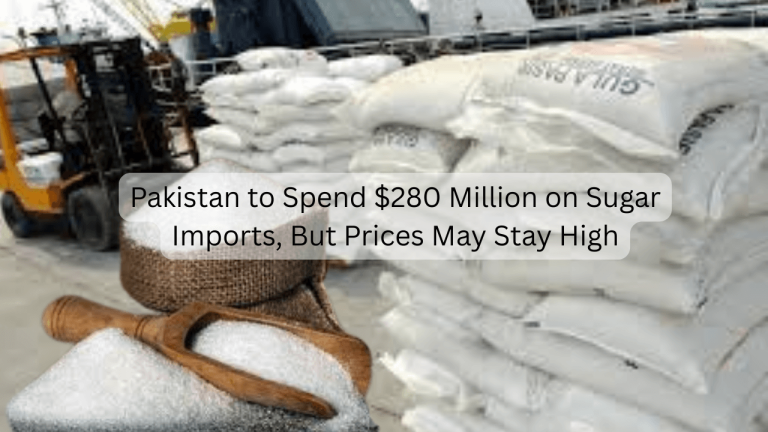Govt’s Sugar Import Strategy to Boost Import Bill by $280 Million, But Won’t Keep Prices Down
ISLAMABAD — Pakistan’s import of 500,000 metric tons of sugar in equal amounts to be imported by the Trading Corporation of Pakistan (TCP) and the private sector is estimated to cost $275–280 million extra to the import bill. Industry insiders think that this step will not reduce the cost of local sugar prices much. Local retail prices are estimated to steady around Rs195–200 per kilogram, while imported sugar is estimated to cost around Rs155 per kilogram.
Tax Exemptions to Reduce Import Cost
To soften the import cost, the government has provided various tax exemptions, such as zero customs duty, 0.25% withholding and sales tax, and exemption from the 3% minimum VAT. These exemptions were made in order to reduce the cost of sugar importation, but they have raised questions over the government’s fiscal discipline, particularly during Pakistan’s current IMF program.
Conflicts over the Import Decision
Sources indicated that the Finance Division was against the notion of offering subsidies or tax concessions for the importation of sugar. Nonetheless, these reservations were overridden by Deputy Prime Minister Ishaq Dar and cleared by the cabinet via a summary circulation, without referring the matter to the Economic Coordination Committee (ECC).
Issues raised by the Competition Commission
The Competition Commission of Pakistan (CCP) took issue with the inconsistency in government policies. As recently as October 2024, the government had facilitated the export of 500,000 tons of “surplus” sugar, which resulted in shortages and price hikes. The CCP has cautioned that these policies tend to be dictated by industry lobbying, which can lead to unwarranted price rises and shortages.
Prices at retail have since gone up to almost Rs200 per kg, with critics opposing it on the grounds that the earlier sugar exports had artificially caused a shortage, and imports are now being employed to cure the situation at great public expense.
Ex-Pakistan Sugar Mills Association (PSMA) chairman Iskander Khan rejected the role of the industry in the import decision. He said that domestic mills hold sufficient stock of sugar—approximately 0.5 million tons—to suffice through the next crushing season.
Continuing Issues Regarding Transparency and Data
The CCP also pointed to longstanding issue about the transparency of sugar prices and the lack of third-party verification of data. The commission cautioned against using industry-provided data as the basis for policy decisions, warning it would promote cartel-like behaviors and allow past fiscal policy errors to be repeated.
Criticism of the Sugar Import Move
Opponents contend that this sugar import action follows an old pattern: industry gains are privatized in exports while losses are socialized through taxpayer-financed imports, with no real consumer benefit. This practice continues to generate skepticism regarding long-term effect on both the economy and the consumer.

